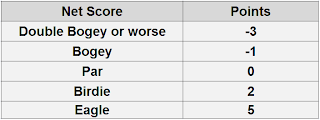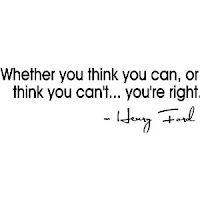On his first hole (the tenth tee) of the OHL Golf Classic at Mayakoba, Kevin Mitchell scored a hole-in-one. You would think everything would be coming up roses for Mitchell after that pumped-up start, and it did...sort of...Mitchell followed through with a birdie on eleven. Then Mitchell took a par, birdie, bogey and finally wound up with a 66 and tied for 68th place after four rounds. (Please note ESPN has his name listed as Keith while Golf Digest lists it as Kevin).
 |
| espn.com/golf/leaderboard |
Can anyone maintain such high expectations after an ace? Should you try?
READ: Try to Win and You Won't?
On the flip side, Zimbabwean golfer, Marc Cayeux, left all expectations behind after a devastating motor vehicle accident left one leg shorter than the other. “It’s been a tough seven years, so, on my first year back, I had no expectations. I just basically tried to get back into the swing of things and learn all over again...". Caveux made the cut!
Managing expectations requires determination. Here are a few tips to help overcome thoughts that consume, in order to get positive results during a round.
1. SLOW DOWN: According to mind coach Gary Leboff, "signs of excessive intensity include rushing your food, driving too fast and shortness of breath." Identifying these changes and consciously doing the opposite will help you get into a calm mindset.
2. MANAGE HIGHS AND LOWS on the course: According to PositiveMentalImagery.com, you will lose momentum if you have a good round going and start to dwell on it. Conversely, don't believe that if you have been blowing all of your putts that it will continue to happen. Maintain realistic expectations about your game and stay grounded.
3. STAY IN THE MOMENT: It's common practice to think about the next shot but, in many cases, golfers think way too far ahead. According to GolfMentalGameCoach.com, when French player Alexander Levy was, " totally immersed in the moment: seeing the shot, playing the shot, seeing the result and then playing the next shot," his game took a turn for the better.
Managing your expectations takes practice and strong resolve; understanding where your weaknesses lie and lessening the pressure you put on yourself is the first step to better enjoyment of the game.
How do you manage your expectations on the golf course? Share in the comments section of Golf for Beginners blog and on Twitter @Golf4Beginners.





